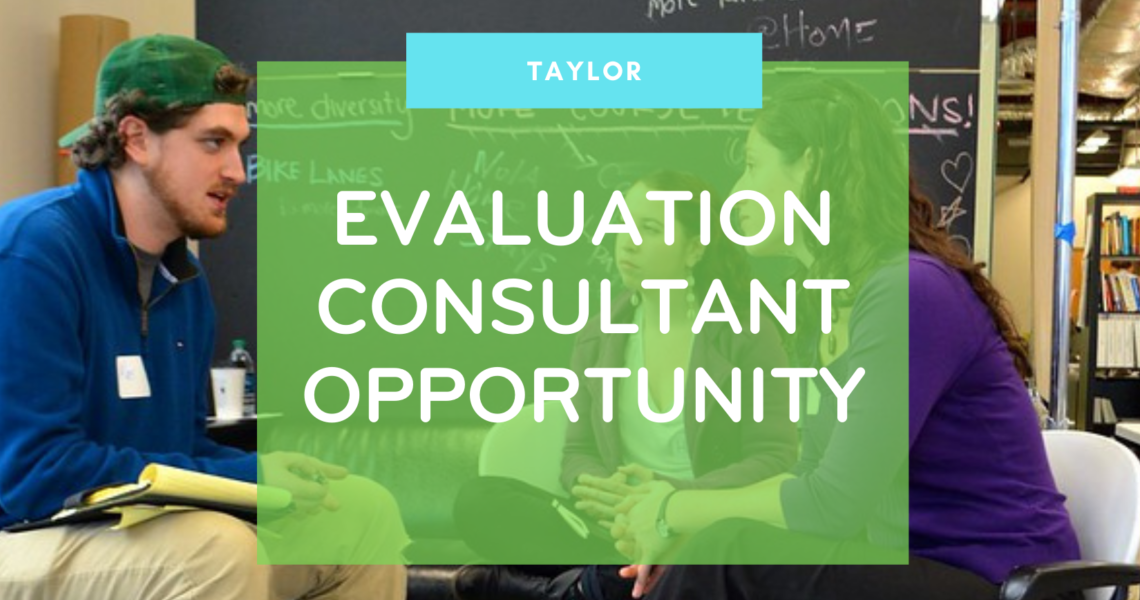
Request for Proposals: Evaluation Consultant
Background
The Phyllis M. Taylor Center for Social Innovation and Design Thinking cultivates a diverse network of changemakers who are working and learning together to create a more just and equitable society. Our programs are grounded in the teaching, research, and practice of social innovation and design thinking.
We are guided by our values:
RESPECT: We are committed to equity and recognize humility and empathy as cornerstones of effective and ethical engagement with others
CONNECTION: We see innovation as a social act that is grounded in the relationships between people across difference.
LEARNING: We practice persistent curiosity and recognize that everyone has knowledge to gain and share.
CREATIVITY: We are committed to being open and at times uncomfortable as we seek out the unexpected in imagining a better world.
The Taylor Center was founded in 2014, growing from social innovation initiatives started in 2009 and an undergraduate minor in social innovation & social entrepreneurship launched in 2012. The Taylor Center underwent a 3-year strategic planning process in 2017, during which evaluation was identified as a key organizational capacity goal. We are also currently re-envisioning our relationship with the undergraduate minor, which is administered through the School of Architecture. While we anticipate that Taylor faculty will continue teaching in the SISE program, we also expect the School of Architecture to build more internal resources for the academic program.
The Taylor Center team has been able to adequately manage fiscal operations and account to the University administration and our current donors. We are currently seeking to develop an evaluation process that can assess programming outcomes, guide internal decision-making, and account to external stakeholders such as campus/community partners and future prospective donors.
Team members are committed to creating transformational learning experiences and positive social change; however, evaluation of our impact is currently happening on a case-by-case basis often without significant expertise in designing evaluation instruments. Additionally, team members have questions about what constitutes success across our various programs and areas of work. We have started an internal process related to a Taylor-wide learning goals framework that we hope can inform our evaluation plan.
In this initial phase of work, we aim to provide evaluation support to two well-established programs that we expect to run consistently in future years: a series of life design workshops and a social venture accelerator program, each with corresponding curriculum. In subsequent phases of work, we aim to expand our evaluation to other programs and initiatives and to our overall center-wide strategy.
Goals & Scope
We anticipate an iterative, phased approach to developing a Taylor-wide developmental evaluation strategy and learning system.
In this initial phase, we seek a consultant to co-create an evaluation process that can support two well-established areas of our work:
- Our social venture accelerator, Changemaker Institute,
- Our life design programming, Taylor Your Life and Taylor Your Tulane.
Additionally, in this initial phase we would like to engage in some exploratory discussions about the value of an organizational-wide evaluation strategy and learning system. We are looking to establish a developmental process that:
- Embeds equity, diversity, and inclusion;
- Assesses learning competencies (details to be shared after selection);
- Incorporates mindsets of design thinking, systems thinking, and social innovation;
- Acknowledges Taylor team members’ various roles as educators, scholars, and practitioners;
- Builds the capacity of Taylor team members to implement and adapt the evaluation process moving forward; and
- Utilizes existing tools provided by Tulane, or paid for by the Taylor Center, as much as possible.
Project Timeline & Deliverables
We will accept applications through October 29, aiming to interview November 1-4 and select the consultant(s) by November 5. The design and implementation timeline is currently flexible and open to discussion with the selected consultant(s); a new cohort of participants will engage with these programs January-May 2022.
We anticipate the deliverables to include:
- Feedback on current assessment instruments and guiding questions
- Program-specific monitoring and evaluation instruments for the Changemaker Institute, Taylor Your Life, and Taylor Your Tulane.
- A supporting document that will assist change management and future onboarding, including but not limited to:
- A description of evaluation instruments and activities with a recommended timeline for annual or semi-annual implementation.
- Guidance for how to use provided evaluation instruments and how to visualize data and/or create reports from data received
- Recommendations for how to continue to adapt the evaluation instruments as programming changes.
- A suggested scope and timeline for a Taylor-wide evaluation strategy and learning system, if deemed appropriate after initial discussions.
Proposal Requirements & Budget
- A cover letter and CV that explains the individual and/or team’s background and qualifications.
- A proposal detailing your approach to the scope of work.
- A budget detailing what could be accomplished with $7,000.
- Three references that can speak directly to your expertise in evaluation.
Evaluation Criteria
The proposal will be evaluated by the program lead of the specified programs (Julia Lang) as well as the center’s Co-Directors (Lavonzell Nicholson and Rebecca Otten). Evaluators will assess each proposal using the following criteria:
- Qualifications of the consultant and/or team.
- Relevant experience in higher education and/or educational programs.
- Relevant experience in Taylor’s areas of work (design thinking, systems thinking, and/or social innovation).
- Demonstrated understanding of the project scope.
- Capacity to provide deliverables within the allocated budget.
Contacts
Questions can be directed to Rebecca Otten, Director of Strategy and Engagement (rotten@tulane.edu) and Julia Lang, Associate Director of Career Education (jlang@tulane.edu).